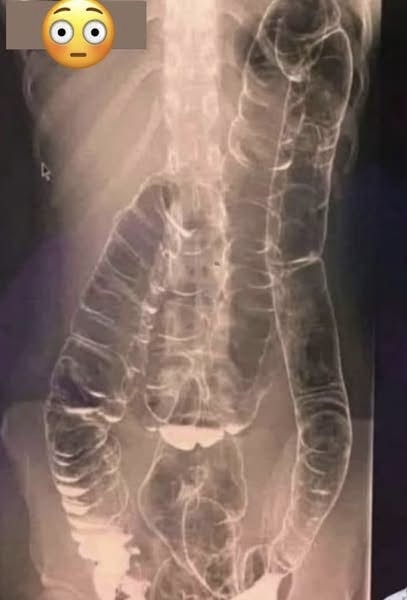Everything You Need to Know About Chronic Constipation: A Hidden Threat to Your Digestive Health

Constipation is something nearly everyone experiences at some point — a few days of discomfort, bloating, and irregular bowel movements.
Most of the time, it clears up on its own with a change in diet or hydration.
But when constipation becomes chronic — lasting for weeks, months, or even years — it stops being a minor inconvenience and turns into a serious health threat.
Left untreated, chronic constipation can lead to life-altering complications, damage your digestive system, and silently poison your body.
And in extreme cases — as one shocking case revealed — it can literally reshape your internal organs.
A Shocking Case: When Constipation Goes Too Far
A now-viral X-ray image of a woman who hadn’t had a bowel movement in two weeks stunned doctors and the public alike.
The image revealed a horrifying truth:
Her colon had stretched so far from the buildup of fecal matter that it rose into her chest cavity, pressing dangerously close to her heart.
The normal, coiled structure of the colon — designed to contract and move waste — had flattened out completely.
The natural folds that help push stool forward were gone.
Her digestive system was no longer functioning — it was failing.
This condition, known as megacolon, is a rare but life-threatening consequence of severe, untreated constipation.
And it could have been fatal.
What Is Chronic Constipation?
Chronic constipation is defined as having fewer than three bowel movements per week for several weeks or longer, accompanied by symptoms such as:
Straining during bowel movements
Hard, lumpy stools
Feeling of incomplete evacuation
Sensation of blockage in the rectum
Needing to use fingers to assist evacuation
Unlike occasional constipation, chronic constipation doesn’t resolve on its own — and it’s not just about “going less often.”
It’s a warning sign that your digestive system is struggling.
Common Causes of Chronic Constipation
While occasional constipation can result from travel or stress, chronic constipation is often rooted in deeper issues:
Low-fiber diet – Not enough fruits, vegetables, and whole grains
Dehydration – Not drinking enough water slows digestion
Sedentary lifestyle – Lack of movement slows intestinal motility
Medications – Opioids, antidepressants, iron supplements, and antacids
Ignoring the urge to go – Delaying bowel movements weakens signals over time
Medical conditions – Irritable bowel syndrome (IBS), diabetes, hypothyroidism, Parkinson’s disease
Pelvic floor dysfunction – Muscles don’t relax properly during bowel movements
Colon inertia – The colon loses its ability to contract effectively
How Chronic Constipation Damages Your Body
When stool sits too long in the colon, it doesn’t just cause discomfort — it triggers a cascade of harmful effects.
- Toxins Re-enter the Bloodstream
As waste sits and decays, toxic byproducts can be reabsorbed through the colon wall into the bloodstream — a process called autointoxication.
This may lead to:
Chronic fatigue
Brain fog
Skin issues (acne, rashes)
Bad breath (halitosis)
Weakened immune system
- Hemorrhoids and Anal Fissures
Straining to pass hard stools can cause:
Hemorrhoids – Swollen, painful veins in the rectum
Anal fissures – Tiny tears in the anal lining that cause sharp pain and bleeding
Both conditions can become chronic and require medical treatment.
- Bowel Obstruction
In severe cases, hardened stool can form a fecal impaction — a blockage that prevents any waste from passing.
Symptoms include:
Severe abdominal pain
Nausea and vomiting
Inability to pass gas
Swollen, hard abdomen
This is a medical emergency — and may require enemas, manual removal, or even surgery.
- Loss of Colon Function
Over time, the colon can stretch and lose its ability to contract.
This condition, called colonic inertia, means the bowel muscles no longer push waste forward — even if you eat fiber or take laxatives.
Once this happens, natural bowel movements may never return without intervention.
Warning Signs You Should Never Ignore
Seek medical help immediately if you experience:
No bowel movement for over a week
Severe abdominal pain or bloating
Vomiting along with constipation
Blood in stool
Unexplained weight loss
A family history of colon cancer
How to Prevent and Treat Chronic Constipation
The good news?
Most cases of chronic constipation are reversible — especially when caught early.
✅ Lifestyle & Dietary Changes
Eat more fiber – Aim for 25–35g daily from fruits, vegetables, legumes, and whole grains
Drink plenty of water – At least 8 glasses a day (more if you’re active)
Exercise regularly – Even walking 30 minutes a day boosts digestion
Respond to the urge – Don’t delay bowel movements
Establish a routine – Try to go at the same time every day (morning is ideal)
✅ Natural Remedies That Work
Prunes or prune juice – Nature’s gentle laxative
Ground flaxseeds – High in fiber and healthy fats
Warm lemon water – Stimulates digestion in the morning
Probiotics – Support healthy gut bacteria (yogurt, kefir, supplements)
✅ Medical Treatments (When Needed)
Osmotic laxatives (e.g., polyethylene glycol) – Draw water into the colon
Stool softeners – Help moisten hard stools
Stimulant laxatives – For short-term use only
Biofeedback therapy – For pelvic floor dysfunction
Surgery – Only in extreme cases of megacolon or obstruction
Final Thoughts: Don’t Ignore the Signals
Constipation is not something to laugh off or “just live with.”
That bloating, fatigue, and discomfort?
It’s not normal.
It’s your body screaming for help.
The case of the woman whose colon reached her heart is a stark reminder of what can happen when we ignore our digestive health.
But it’s also a wake-up call — and a chance to act.
Start today:
Eat more fiber
Drink more water
Move your body
Listen to your gut
Because when it comes to your colon,
the best time to fix it was yesterday.
The second-best time is right now.
Your digestive health is not a luxury — it’s the foundation of your entire well-being.